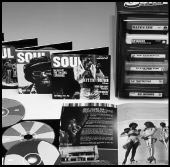I grew up in an extremely white household; not Casper-the-Friendly-Ghost white, like the Cleaver clan on TV, but darned close. Unless you count Scott Joplin, the only black music in our house for many, many years came courtesy of Louis Armstrong, Leadbelly, and Harry Belafonte, represented in my Dad’s record collection by one rarely played LP apiece.
Consequently, my love of soul music had nothing to do with genetics or environment. I didn’t get wise until the mid-’80s, when, after I praised Belinda Carlisle’s lackluster cover of “Band of Gold,” an older friend threatened to box my ears if I didn’t buy Freda Payne’s original 1970 hit version. I did so immediately. Fifteen years—and many, many records—later, I’d say that for a sawed-off cracker, and a fag to boot, I’ve got way more soul than the average bear.
After the initial shock of Sept. 11 subsided, and I finally was able to listen to music again, many of the songs that resonated deepest were ’70s soul sides. One afternoon while walking to the post office, I practically broke into tears when I heard the O’Jays’ 1973 No. 1 smash “Love Train” drift out of a passing car. And I played “O-o-h Child” by the Five Stairsteps ad infinitum, letting Alohe Burke’s compassionate vocals wash over and soothe me. At a time when my emotions were running at their highest, only the unabashed passion of songs like these could comfort me.
How can music made 30 years ago still seem so timely? “The ’70s were more culturally aware,” suggests U.K. DJ-producer Kirk Degiorgio, who knows the topic well. Not only is he the host of the soulful Sunday night radio show R-Solution on London’s KISS-FM, on which he’s been showcasing cuts like “World in Crisis” by Barbara Mason since the World Trade Center catastrophe, but his latest album, under his As One moniker, is titled 21st Century Soul (Ubiquity).
“There was a lot more cultural energy coming out of the ’60s, and, of course, the civil rights movement was still in progress,” he continues. “And even though the hippie dream had kind of failed, there was still a hangover from that with Vietnam. Now, I think people are a lot more apathetic and consumer oriented. It’s a lot more about money these days.”
Ironically, if you’re a classic soul connoisseur these days, big bucks are often exactly what you need to enjoy these records, many of which are out of print. After hearing “Ungena Za Ulimwengu (Unite the World)” by the Undisputed Truth on Howie B.’s installment of the Another Late Night (Kinetic) after-hours mix CD series, I decided I needed to hear more from the group that visionary producer Norman Whitfield groomed to be “a perfect cross between Sly [Stone] and the Fifth Dimension.” No such luck. Except for their sole 1973 chart entry, “Smiling Faces Sometimes,” none of the group’s catalog is available on CD. When I finally did track down a vinyl copy of 1971’s Face to Face With the Truth, which features the chilling “You Make Your Own Heaven and Hell Right Here on Earth,” it set me back almost 20 bucks. Ouch!
Fortunately, the tireless archivists at Rhino have come to the rescue with the six-CD set Can You Dig It? The ’70s Soul Experience. Of the 136 tracks included, over half reached No. 1 on either the pop or R&B charts, so there’s plenty of familiar material: “Midnight Train to Georgia”; “Theme from Shaft”; “Let’s Get It On.” (And has there ever been a more comforting chart topper than Bill Withers’ “Lean on Me”? I think not.) But the real gems here are the lesser-known cuts, like “Crumbs off the Table” by the Glass House, a midtempo number on which Freda Payne’s sister Scherrie (later a member of the Supremes) disses a lazy lover without even breaking a sweat.
And if the troubles of the world have prompted you to play Marvin Gaye’s “What’s Going On” so many times even this masterpiece has started to lose its potency, check out track four, disc four: “Why Can’t We Live Together” by Timmy Thomas. After a minute-and- a-half instrumental intro of nothing but spacey percussion and staccato organ chords, Thomas comes in pleading, “Tell me why, why can’t we live together?” then reminds us that “No matter what color, you are still my brother.” If you only know Sade’s narcoleptic rendition, the original will leave you breathless.
With a suggested retail price of $99.98, Can You Dig It? The ’70s Soul Experience doesn’t come cheap. But the packaging is impressive (the CDs come housed in a faux eight-track tape holder), and you could spend a lifetime buying used 45s and never round up all these songs. Don’t think about the money too much; just consider this a wise investment for an uncertain future. This isn’t music that goes out of style.






